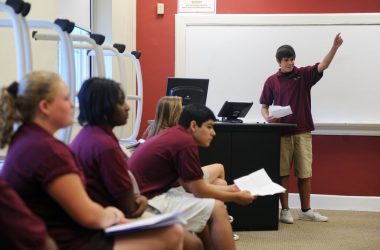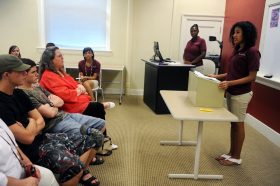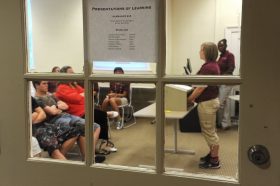The youngest scholars spoke on the habits of highly effective teenagers, while those a year older focused on how the Elon Academy has changed their lives. The eldest of the Elon Academy students who presented to classmates, parents and educators on Friday evening? They read from the first drafts of admissions essays that will be used this fall to apply for college educations many once thought were out of reach.

Seventy-three of Alamance County’s most promising high school students in the 10th through 12th grades concluded the summer 2011 component of the Elon Academy college access and enrichment program in a July 15 evening “Presentations of Learning” program that took place in Alamance building. The presentations were followed by a closing ceremony in Whitley Auditorium.
Unlike the past two summers, during the most recent presentations, students had no posters or multimedia displays on which to rely for their remarks. That was intentional, academy leaders said.
“It’s a chance for them to showcase their own mastery of their meta cognition, understanding the value of the learning they’ve done here and looking forward to the future,” said assistant professor Kim Pyne, the assistant director of the Elon Academy for academic programs. “This year we’ve focused on building their personal presentation skills. We’ve taken away all the frills and are focusing on their delivery.”
Students rose to the challenge.
“Without the Elon Academy, I still would have gone to college,” Melissa Chacon, a rising junior at Western Alamance High School, said in her presentation in Room 203. “But who knows where my standards would have been set? … The Elon Academy has given me the opportunity to see and learn fantastic things that will take me to college.”

For the Epsilon class, the youngest cohort of scholars, presentations based on the book “The Seven Habits of Highly Effective Teens” by Sean Covey afforded a moment to share traits the scholars hoped to develop in the years ahead. For one student, that means taking a more active approach to listening.
“A lot of times people just want you to listen to them. Instead, we interrupt them or start giving them advice they don’t want,” Celina Dimas, a rising sophomore at Cummings High School in Burlington, N.C., said moments before the presentation started. “They just want to be understood.”
Western Alamance High School rising sophomore Annie Kang said the evening presentations were important if for no other reason that it “gets me out of my comfort zone.” “Doing this,” she said, “will help me get past my wall of being shy.”
Elon University launched the Elon Academy in 2006 to give students from local high schools the opportunity to embrace education, develop leadership skills and engage in various outreach venues.
Modeled after similar programs at Princeton, Furman and Vanderbilt universities, the Academy is a year-round program for students in the Alamance-Burlington School System who have financial need or have no family history of college attendance. It combines three intensive four-week summer residential experiences at Elon with a variety of academic activities throughout the school year.
Its goal is to inspire and empower students to attend four-year colleges or universities, and go on to assume leadership roles in their communities.



